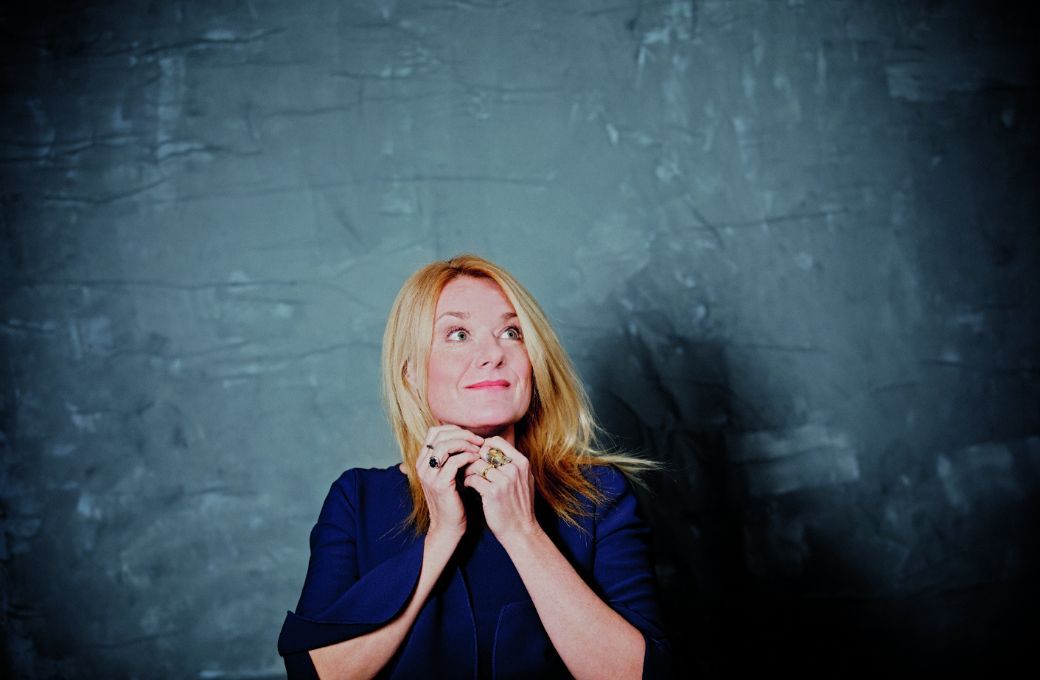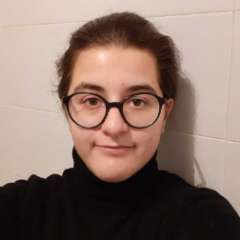There is something so intimate about a mother tongue – not just because it is our very first family heirloom, as the word ‘mother’ suggests. But our first language has ramifications for everything we experience. Why else would we go back to it in the most emotional and personal moments, in love, anger, confession, and poetry?

If speaking our mother tongue helps us understand ourselves and our closest environment, singing in it is a more intricate matter, one that transcends our particular voice and connects us to others, who may be far away in time or space. I reflected on this – among other things – with Magdalena Kožená, recipient of the 2025 Antonín Dvořák Award, who in a brilliant career as a mezzo has developed a long-lasting relationship with the musical traditions of her native Czech Republic.
Established in 2009 by Prague’s Academy of Classical Music, every year the Antonín Dvořák Award honours artists who have consistently dedicated themselves to performing and promoting Czech classical repertoire. Laureates have included musicians such as Josef Suk, Ludmila Dvořáková, Yo-Yo Ma, and Sir András Schiff, but also choreographers and directors such as Barrie Kosky, who received the Award in 2024.
This year, a double award was granted, to celebrate the steadfast dedication to Czech music that Kožená shares with her husband, Sir Simon Rattle. Winners are selected by a council consisting of prominent figures of the Czech and international music scene, including the Academy’s own Artistic Director Jan Simon, Zurich’s Tonhalle’s Artistic Director Ilona Schmiel, and past laureate Jakub Hrůša.
“While growing up, I was immersed in Czech repertoire,” Kožená recalls. “I started playing piano at six, and at the same time I was singing in the Kantiléna Children’s Choir of the Brno Philharmonic Orchestra – a very professional ensemble, often involved in productions of the Janáček Theatre. Naturally, this allowed me to grow familiar with Czech as a sung as well as spoken language at a young age.”
Determined to dedicate herself to music, Kožená kept treading the two parallel paths of voice and piano until her third year at the Brno Conservatory, when she formed a small ensemble for Renaissance and Baroque music with a fellow student and lute player Miloslav Študent. Becoming a full-time singer, Kožená’s identity as a young artist continued to develop during her studies. Together with a passion for Early music, the Conservatory’s focus on Germanic composers introduced her to the Lieder of Schubert, Schumann and Brahms, repertoire that accompanies her to this day. A later blooming passion for French music completes the picture of Kožená’s musical predilections. Yet between this variety of languages, Czech holds a unique place.
“As a Czech singer, I have... not a duty, since the word might come across as negative, but I am lucky enough to have this language free of charge,” she reflects. “I know it is a difficult one to master. Several colleagues have told me they love Czech music, but the language is a barrier to them. Even native Czech singers sometimes face difficulties. Janáček’s librettos, for example, have an idiom of their own, almost like a slang that is specific to his operas and hard to penetrate. For this reason, it is often easier to pick the best-known pieces, which usually have a performance tradition to fall back on.”
Inevitably, this starts a self-fuelling cycle where a few rightfully popular masterpieces overshadow the richness of the Czech repertoire, usually in favour of a handful of operas. Presenting more obscure compositions becomes a matter of curiosity and confidence. As Kožená explains, “I have always loved opera, but I am also grateful for the positive feedback I have got in the song repertoire. It is quite unexpected. Especially nowadays, we tend to read little or no poetry, and we can’t concentrate that long – a situation that’s not very encouraging for a Liederabend. Instead, I have found audiences to be motivated and prepared. Even with composers they’ve never heard of, people feel encouraged to explore the rest of their oeuvre, both vocal and instrumental.”
Is the language a barrier to audiences as much as it is to singers? “Most times, not really. Thankfully there are translations in programme notes – which I invite everyone to read before the concert, not during,” she teases, “and for opera, surtitles usually help. I don’t think there is a need nowadays for old-fashioned practices like singing a libretto in translation. What’s more, it is our job as singers to convey at least the emotional core of the piece. Ultimately it is the same as with every language – I am sure not all Italians who listen to Wagner know German that well.”
However smooth Kožená’s words may make it out to be, so much interest in musical rarities does not arise without effort. The responsibility to take risks with less common programmes falls on performers as well as on institutions, venues, and record labels. On her part, Kožená has been working tirelessly to guide audiences into new, unexpected musical ventures. “I have already found and sung most of what I wanted to find and sing. At this point it is just a matter of bringing it around the world as much as possible” she says enthusiastically.
As for specific pieces of her repertoire that she wishes were heard more frequently, “next to Dvořák’s songs, which are fairly popular already, Martinů’s opera Julietta is a speciality that more people should know. There’s also an amazing orchestral work that Ondřej Adámek wrote for me, called Where Are You?, that I am incredibly proud of and try to perform often.”
Kožená has been hard at work in the recording studio too. Two recent releases were created as part of Kožená’s and Rattle’s residency with the Czech Philharmonic, of which Rattle has been Principal Guest Conductor since 2024. The first, Folk Songs, features a collection of pieces by Bartók, Berio, Ravel and Montsalvatge, while the second, Czech Songs, pairs Martinů’s Nipponari and Songs on One Page with Dvořák’s Evening Songs and Krása’s Four Orchestral Songs. Evocative and labyrinthine, this slice of Czech music between the 19th and 20th centuries is a highlight of shared artistry and sensitivity and, most likely, one of the reasons for the awarding of the Dvořák Award.
“When I started singing, I worked with labels that were eager to release little-known music. The market allowed it, and it made me the singer I am today. I couldn’t imagine recording the same famous aria for the hundredth time,” she admits. “The same spirit inspired Czech Songs. Most compositions on the album are hardly ever performed in concert. For Nipponari in particular, I believe it almost works better in recording than it does live, since it’s such a meditative piece with few inner contrasts. It sets an amazing mood, and performing with Simon and the Czech Philharmonic made it even more precious.”
With an extensive repertoire at her fingertips, the question arises naturally: is there such a thing as a ‘Czech sound’ that identifies Czech music across centuries? Kožená’s answer is sceptical. “I doubt it. Our music history is so varied, from Zelenka to contemporary times. Of course, if you listen to composers from the Romantic period there is a strong fascination for folklore and a ‘typically Slavic’ melancholy, but they are not strictly Czech. Even just composers who are only one generation apart, like Dvořák and Martinů, exist in different realms.”
However, a distinctive sound is to be found elsewhere. “Perhaps it is not composers, but rather performers that pass on a characteristically Czech style of playing. The Czech Philharmonic has an unmistakable, almost instinctive way of imagining colours and shaping rhythm. When Simon conducts the same piece – say Dvořák’s Slavonic Dances – with the Berlin Philharmonic or the Czech Philharmonic, it’s beautiful to see how the results are so different for ensembles of the same calibre. And speaking of ‘Slavic voices’,” she adds, “tenors who sing Janáček tend to have brighter voices, powerful and with less vibrato, sharper than in the Italian tradition.”
A good time to have a taste of Czech-style opera performances is this November and December, with Kožená’s return to Brno’s Janáček Theatre after thirty years for Handel’s Alcina. For those who can’t make it, however, Kožená and Rattle will be in Prague and Berlin between December and February with programmes not to be missed: Messiaen’s Poèmes pour Mi and Mahler’s Fourth at the Prague Rudolfinum, and a new production of Janáček’s The Cunning Little Vixen at the Berlin Staatsoper (I’m looking forward to this one!).
In between these two occasions, the pair will have one more event to attend: the Dvořák Award ceremony, in the Spanish Hall of the stunning Prague Castle. During the celebration a chamber concert will greet the two artists with compositions by Dvořák and Beethoven, as an acknowledgment for past achievements and a good omen for their future.
Magdalena Kožená and Sir Simon Rattle receive the 2025 Antonín Dvořák Award at a ceremonial concert at Prague Castle on 14th December. Kožená and Rattle perform Messiaen and Mahler with the Czech Philharmonic on 17th–19th December.
Kožená sings in The Cunning Little Vixen at the Staatsoper Berlin from 28th February to 15th March.
See upcoming performances by Magdalena Kožená.
This article is also available in Czech.
This article was sponsored by the Academy of Classical Music.


